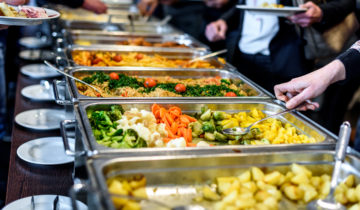Institutional catering has to respond to multiple expectations: flavour and nutritional properties, product quality, presentation and more. This is compounded by considerations outside the food itself, such as its ecological impact, its seasonality and its production conditions. This last point applies in particular to meat and other livestock products, especially in terms of animal welfare. Diners are becoming increasingly sensitive to these issues, which chefs must address in a variety of ways.
High-quality, transparent product sourcing
Serving high-quality dishes presupposes, first and foremost, knowledge of their ingredients’ origins and characteristics, including their nutritional quality, safety and farming conditions. Which is why the choice of suppliers is of the utmost importance, because you can’t make good dishes without good ingredients! As a result, buying from trusted actors is essential: 88% of institutional catering diners want to know where the products they eat come from.
Thanks to their closeness to farmers and their commitments to animal welfare issues, co-operatives are ideal partners for institutional caterers. By controlling every link in the production chain, with no intermediaries, they occupy a privileged position when it comes to defining and improving practices. For example, Cocotine has set itself the goal of completely eliminating its caged chicken farming and promotes an increased consideration of animals’ needs by producing alternatively farmed and organic eggs, especially through our “Code 2 – animal welfare” range, whose products satisfy consumer expectations.
Cooking for animal welfare
Taking animal welfare into account also involves thinking about the dishes offered to guests. And it only takes a few adjustments to adapt your cuisine. The number of people who have adopted a vegetarian or flexitarian diet (the latter involving reduced meat consumption) continues to rise, and the replacement of meat with plant proteins or eggs is in line with diners’ requirements. The fact is that more and more consumers today pay attention to farming conditions. For example, 92% of French people think animal welfare is important, and more than half of them have reduced or plan to reduce their consumption of meat. As a sign of these changing habits, concept restaurants like Egg Factory in France are promoting eggs as a main ingredient on their menus.
In addition, egg products can be used at any point in a meal: starters, main courses and desserts, as we demonstrate in this blog post. Whether as the main ingredient or simply one of many, they deliver essential proteins to keep diners healthy and adapt easily to chefs’ needs. As a result, the role of eggs in institutional catering can only be expected to grow. Offering fewer meat-based dishes contributes to animal welfare by reducing pressure on the sector and emphasising product quality.
Animal welfare is becoming increasingly important to diner appreciation and to the choices they make at restaurants. So, it is likewise important to communicate about your establishment’s choices in this direction in order to promote your commitments to menus that are more organic and more environmentally friendly. With this in mind, selecting trusted actors – especially co-operatives that truly embody their stated values – gives institutional catering chefs access to a sure supply of meaningful products.







